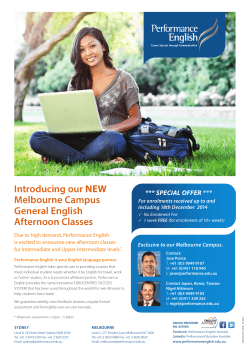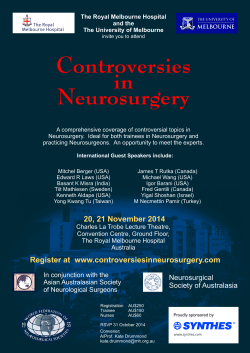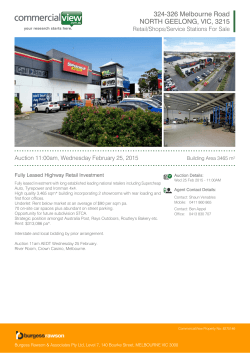
clicking here - RMIT UrbanEco2015 Symposium
DAY 1 ‐ MONDAY 30 MARCH 2015 8.00 am – 8.50 am REGISTRATION 8.55 – 9.30 am Welcome to RMIT: Paul Gough, Pro Vice‐Chancellor and Vice‐President, RMIT University, College of Design and Social Context Opening address: Melbourne’s perspective Kate Roffey, CEO, Committee for Melbourne The Imperative for Change The Hon. Tom Roper, Project Director – Climate Institute and former Minister for Planning & Transport KEYNOTE: International perspective Urban Ecology and the Future Eco‐City Dr Ekhart Hahn, Professor, University of Dortmund, Germany Renowned pioneer of urban and regional ecological planning, based in Berlin Q&A and Panel discussion 9.30 am – 10.30 am 10.30 am – 10.50 am MORNING TEA 10.50 am – 12.00 noon THE CITY AND ITS “CITYZENS”: Planning & Urban Development for an Effective Eco‐City Professor Michael Buxton, RMIT University, College of Design and Social Context Building Cities for Health, Sustainability and Democracy Dr Peter Sainsbury, Director of Population Health in South Western Sydney Local Health District. 12.00 noon – 1.00 pm LUNCH AND NETWORKING 1.00 pm – 2.10 pm ENERGY AND INFRASTRUCTURE: Zero Carbon Energy: Efficient Alternate Technologies Alan Pears, energy thought leader Public and Private Mobility William McDougall, Transport Planner, Engineer, Economist 2.10 pm – 2.30 pm AFTERNOON TEA Page | 1 DAY 1 ‐ MONDAY 30 MARCH 2015 2.30 pm – 4.05 pm 4.05 pm – 4.30 pm 4.30 pm SUSTAINABLE SYSTEMS: Food as a Vehicle for Sustainable Development Sharelle Polack, Acting CEO, Cultivating Community & Dr Seona Candy, Post‐Doctorate Research Fellow: Sustainable Food Systems, Victorian Eco‐Innovation Lab (VEIL), University of Melbourne RMIT Video Presentation. Stewardship And Material Circularity. Andrew Egans, Egans Asset Management Peter Mulherin, Product Wise, RMIT University The Blue is the New Green. The Benchmark for Urban Ecology Just Got More Interesting Anne‐Maree Huxley, Founder and CEO, Models of Success & Sustainability Panel Discussion and Questions An opportunity to return to the subjects covered throughout the day, field your questions to the presenters and set the scene for the remainder of the Symposium CLOSE Page | 2 DAY 2 ‐ TUESDAY 31 MARCH 2015 MORNING PROGRAM: Concurrent sessions. Each group session includes a 20 minute break, morning tea: 10.30am ‐10.50am 8.00 am – 9.00 am REGISTRATION 9.00 am – 12 noon Group 1 FUTURE BUSINESS The Innovative, Enabling Economy for Sustainable and Ethical Business Tom Quinn, Future Business Council Disrupting vested interests and out‐dated business models: How to make our economy an enabler for innovative, sustainable and ethical business. Redefining Success in Business: The Power of Business with Purpose Alicia Darvall, B Lab Australia & New Zealand The B Corp model and promoting better business using the power of business to solve social and environmental problems. The Role of Business in Creating a Zero Net Emissions Economy Scott Ferraro, ClimateWorks Australia, Head of implementation What role can business play, and what are the growth opportunities, in achieving deep decarbonisation by 2050. Panel discussion 9.00 am – 12 noon Group 2 COLLABORATIVE INITIATIVES FOR URBAN FUTURES Case Studies: Industrial Ecology Dr David Ferrari, Project Lead, Energy Efficiency & Industrial Ecology at Sustainability Victoria Tashia Dixon, Brimbank City Council, The Living Brooklyn project Sarah King, CSIRO (ASPIRE) Tina Perfrement, City of Greater Geelong, Future Proofing Geelong Amadis Lacheta, Hume City Council, BEN and the opportunities of networking Case studies and presentations with audience participation Local Governance, Urban Growth and Development Fran MacDonald, Western Alliance for Greenhouse Action (WAGA) No time to wait and no price on carbon; how can we achieve a low carbon economy? Local government and business alliances are developing regional plans for transition to a low carbon economy e.g. ‘Low Carbon West’. A panel discussion using worked examples of responsible design, use and material recovery through local initiative and collaboration. Panel discussion Page | 3 DAY 2 ‐ TUESDAY 31 MARCH 2015 MORNING PROGRAM: Concurrent sessions. Each group session includes a 20 minute break, morning tea: 10.30am ‐10.50am 9.00 am – 12 noon FOOD & SUSTAINABILITY Group 3 Mapping the Food System in the Urban Environment (Part 1) Dr Seona Candy, Post‐Doctorate Research Fellow: Sustainable Food Systems, Victorian Eco‐Innovation Lab (VEIL), Melbourne University Kate Archdeacon, Industrial designer, Project Manager, Victorian Farmers Market Association Nick Casey, Senior Research Analyst, Melbourne City Research Dianne McGrath, School of Civil & Chemical Engineering, RMIT University, Co‐founder of Watch My Waste Hannah Schwartz, Executive Officer, 3000acres Lee Tozzi, Sustainable Food Officer, City of Darebin Karli Verghese, Associate Professor, Centre for Design and Society, RMIT University Urban societies are increasingly separated from food, yet food is a critical component of their economic, social, environmental and political systems. Through utilising resources within urban landscapes to grow food this can improve sustainability and wellbeing of the communities. 9.00 am – 12 noon Group 4 ALTERNATE TECHNOLOGIES Natural Gas Studies Damian Moyse, Policy and Research Manager, Alternative Technology Association (ATA) & Nicholas Carazzo, ATA, RMIT University Are we still cooking with gas? Economic implications of gas price rises versus efficient electricity Integrating Energy Efficiency and Operational Management John Boothroyd, Honeywell Technology trends in building management. Solving operational problems in the built environment can facilitate the next wave of environmental outcomes. Hybrid District Energy Systems Erwin Boermans, COMFORTiD Waste energy community power schemes. With over 5000 operational around the world, modern hybrid district heating & cooling networks have a variety of heat sources and a range of heat customers. Page | 4 DAY 2 ‐ TUESDAY 31 MARCH 2015 MORNING PROGRAM: Concurrent sessions. Each group session includes a 20 minute break, morning tea: 10.30am ‐10.50am 9.00 am – 12 noon URBAN DESIGN Group 5 Design Empathy, Circularity, Stewardship Rob Eales, RMIT University Industrial ecology. Opportunities for design for sustainability, circularity and stewardship. Could current infrastructure be reorientated for a low carbon future? A presentation and speculative workshop 9.00 am – 12 noon Group 6 DESIGN IN URBAN ECOLOGY Microclimate and Biomimicry in the City – Buildings and Spaces in Between Tim Angus, Technē Architecture +Interior Design Ian Jones, Vipac Engineers & Scientists An architect and engineer with a long history of collaboration talking about how the study of nature’s genius could inspire the design of an Eco‐ City. Imagine a building like a tree, and, a city like a forest. A presentation with case studies and discussion Micro Environmental Modelling Peter Steinle, Bureau of Meteorology (BOM) Managing the impact of weather in urban areas. Weather modelling simulation at scales of 10‐100m provides opportunities for planning and energy use in the urban environment. A presentation, case study and discussion. Passive House in Melbourne 2030 John Bergin, Nunawading Emissions Offset (NEO), Pilot Project An opportunity to establish a key project focus that initiates world leading sustainable development outcomes exists in Melbourne. With many millions of government and private dollars on proposed projects around Melbourne there is an immediate opportunity to direct this expenditure into an ‘Emissions Offset Pilot Project’. Panel discussion 9.00 am – 12 noon Group 7 GREEN BUILDINGS TOUR ‐ 1 Visit Leading Sustainable Buildings – Guided Walking Tour Fiona Golding, Architect & Eleanora Georgiou RMIT Swanston Academic Building tour: Building 80, 427‐433 Swanston St., Melbourne The University of Melbourne’s School of Design Building tour: Swanston St., Carlton Return to storey Hall for lunch and networking Tour Page | 5 DAY 2 ‐ TUESDAY 31 MARCH 2015 AFTERNOON PROGRAM: Concurrent sessions. Each group session includes a 20 minute break, afternoon tea: 2.10‐2.30pm 12 noon – 1.00 pm LUNCH AND NETWORKING 1.00 pm – 4.00 pm Group 8 LEADERSHIP & REGENERATIVE ECONOMY Wealth from Hygiene Waste Mark Dunn, Relivit Recovering resources that would otherwise be lost to landfill. Urban Mining and Advanced Recycling: Assessing Metal Flows in Urban Australia Dr Ruth Lane, Monash University & Dr Gavin Mudd, CSIRO ‘Wealth from Waste’ research cluster Metals are valuable resources, and yet we continue to waste them through landfill or exporting our technological wastes overseas – despite electronics containing up to 600 times more valuable metal than ore. Leadership for Sustainability: creating communities of future makers David Seignior & Matt Wicking, Facilitators, Centre for Sustainability Leadership (CSL) Providing emerging leaders with the skills, knowledge and networks to help shape a sustainable future. Fostering and expanding an ‘ecosystem’ of creative, compassionate, courageous and collaborative leadership. Panel discussion 1.00 pm – 4.00 pm DESIGN, HEALTH & RESILIENCE (BEHAVIOUR) Group 9 Engaging Diversity for Discourse Fiona Jewell, Diversity by Design Cultural and social diversity. Communicating effective planning strategies to engage communities. Winning Hearts and Minds Gerard Healey, ARUP The role of emotion and logic in decision making in sustainable design. The Craft and Science of Change‐Making Leigh Baker, Balance3 Delivering innovation in human systems Panel discussion Page | 6 DAY 2 ‐ TUESDAY 31 MARCH 2015 AFTERNOON PROGRAM: Concurrent sessions. Each group session includes a 20 minute break, afternoon tea: 2.10‐2.30pm 1.00 pm – 4.00 pm FOOD & SUSTAINABILITY Group 10 Mapping the Food System in the Urban Environment (Part 2) Dr Seona Candy, Post‐Doctorate Research Fellow: Sustainable Food Systems, Victorian Eco‐Innovation Lab (VEIL), Melbourne University Kate Archdeacon, Industrial designer, Project Manager, Victorian Farmers Market Association Nick Casey, Senior Research Analyst, Melbourne City Research Dianne McGrath, School of Civil & Chemical Engineering, RMIT University, Co‐founder of Watch My Waste Hannah Schwartz, Executive Officer, 3000acres Lee Tozzi, Sustainable Food Officer, City of Darebin Karli Verghese, Associate Professor, Centre for Design and Society, RMIT University Urban societies are increasingly separated from food, yet food is a critical component of their economic, social, environmental and political systems. Through utilising resources within urban landscapes to grow food this can improve sustainability and wellbeing of the communities. 1.00 pm – 4.00 pm WHERE TO WITH WASTE? Group 11 Landfill Industry Perspectives Sam Bateman, Bateman Brothers Consulting Our largest landfills are within the urban growth boundary. Risks and opportunities for local communities. Smart Waste Management, Resource Recovery and Community Wellbeing Harry Van Moorst, Western Region Environment Centre Innovation strategies for waste management. Towards zero waste. Food and Flexible Plastics in the Waste Stream Rob Millard, CEO, Metropolitan Waste and Resource Recovery Group Round tables to industry engagement. Panel discussion Page | 7 DAY 2 ‐ TUESDAY 31 MARCH 2015 AFTERNOON PROGRAM: Concurrent sessions. Each group session includes a 20 minute break, afternoon tea: 2.10‐2.30pm 1.00 pm – 3.30 pm GREEN BUILDINGS TOUR ‐ 2 Group 12 Visit Leading Sustainable Buildings – Guided Walking Tour Fiona Golding, Architect & Eleanora Georgiou The Urban Workshop (Sustainability Victoria) tour: 50 Lonsdale St., Melbourne Environmental Protection Authority’s Sustainable Head Office tour: 200 Victoria St., Carlton Tour 2.00 pm – 4.00 pm Group 13 INDIGENOUS CULTURE *PLEASE NOTE: start time and location Walkin’ Country, Walkin’ Birrarung – Guided Walking Tour Dean Stewart, Aboriginal Tours and Education Melbourne Cultural tour of Melbourne: An introduction to Melbourne’s Aboriginal and early settlement history along Birrarung Marr (River of Mists). Enterprise Park, 469‐503 Flinders Street, Melbourne VIC 3000* Tour 4.00 pm – 4.30 pm CLOSE Return to Auditorium for networking and closing statements Page | 8 DAY 3 ‐ WEDNESDAY 1 APRIL 2015 MORNING PROGRAM: Concurrent sessions. Each group session includes a 20 minute break, morning tea: 10.30am ‐10.50am 8.00 am – 9.00 am REGISTRATION 9.00 am – 12 noon Group 1 SUSTAINABLE DEVELOPMENT (LOCAL GOVERNANCE) Integrated Water Management for Enhanced Liveability Dr Lisa Ehrenfried, Water and Catchments/Dept. of Environment, Land, Water & Planning (DELWP) How to turn the water challenge of a growing Melbourne into an opportunity Urban Encroachment and Policy Alistair Nairn & Stefan Kaufman, Environment Protection Authority (EPA) Planning approaches and development response to residential encroachment on industrial zones. Cheap Water Comes at Some Cost Sarah Rees, MyEnvironment Inc. Innovative land use change to maintain Melbourne’s liveability. The discussion will cover topics such as the role of the Mountain Ash forests in Victoria in water security and wellbeing. Panel discussion 9.00 am – 12 noon Group 2 LIVEABILITY and WELLBEING Redeveloping Urban Sustainability Ian Adams, Organica Engineering A case study on the Westwyck Stage 2 eco‐village apartment development in West Brunswick: targeting zero emissions and a whole water cycle management approach. Westwyck is Australia’s first One Planet certified project, applying innovative green technologies such as geopolymer concrete, natural refrigerants and re‐use of train tracks as the structural steel for the building. Marketing for Sustainable Developments Ricki Hersburgh, Manager Sustainability, Urban Development Institute of Australia (UDIA) Steve Mathews, Mullum Creek, Mullum Development David Kobritz, Polaris, Dealcorp UDIA’s contribution to a sustainable environment. Case studies on the Institute’s EnviroDevelopment Program. Hear from leaders who will share their projects outlining the challenges, benefits and future vision for sustainability. Panel discussion Page | 9 DAY 3 ‐ WEDNESDAY 1 APRIL 2015 MORNING PROGRAM: Concurrent sessions. Each group session includes a 20 minute break, morning tea: 10.30am ‐10.50am 9.00 am – 12 noon DEEP ECOLOGY AND SYSTEMS Group 3 Place‐Making as the New Environmentalism ‐ Creating Just and Resilient Places Gilbert Rochecouste, Village Well How to authentically engage citizens towards a Life Nourishing story. An integral approach to Place‐making will be presented with exemplar case studies. Participants will leave with a taste of the new emerging eco‐ city narrative around a place‐based approach. A dynamic, immersive, fun & experiential workshop 9.00 am – 12 noon Group 4 BUILT ENVIRONMENT Restoring Urban Ecology in Streets and Waterways Lisa de Kleyn, Co‐Convenor, Brunswick Communities for Nature & Brian Bainbridge, President, Indigenous Flora and Fauna Association, Ecological Restoration Planner, Merri Creek Management Committee A case study of inner‐city residents taking ownership of the biodiversity in their streets; and the evolution of the Merri Creek habitat corridor – wildlife observations that may indicate its success and limitations. Biodiversity Sensitive Urban Design Georgia Garrard, RMIT University, Global, Urban and Social Studies Case Study in Sustainable Facilities Management Murray Walls, RMIT Sustainable Urban Precincts Program (SUPP) Nick Bamford, AECOM Investing in a sustainable future, embedding sustainability into learning, teaching and operations. Panel discussion 11.00am – 5.00pm Group 5 GREEN BUILDINGS TOUR ‐ 3 *PLEASE NOTE: start time is 11.00 am Visit Leading Sustainable Buildings – Guided Walking Tour Fiona Golding, Architect & Eleanora Georgiou RMIT Swanston Academic Building tour: Building 80, 427‐433 Swanston St., Melbourne Return to storey Hall for lunch and networking The Urban Workshop (Sustainability Victoria) tour: 50 Lonsdale St., Melbourne Environmental Protection Authority’s Sustainable Head Office tour: 200 Victoria St., Carlton Australian Conservation Foundation your: Green 60L Building, Leicester St., Carlton Tour Page | 10 DAY 3 ‐ WEDNESDAY 1 APRIL 2015 AFTERNOON PROGRAM: Concurrent sessions. Each group session includes a 20 minute break, afternoon tea: 2.10‐2.30pm 12 noon – 1.00 pm LUNCH AND NETWORKING 1.00 pm – 4.00 pm Group 6 TRANSPORT Cycling vs. Bike Riding – Normalising a Healthy Habit Bart Sbeghen, Manager, Bikes Future Why current street environments and policy exclude most people from healthy transport. What is needed? Who are the stakeholders? How do we engage the wider community? Neighbourhoods, streets, paths, buildings and support programs that allow everyone to ride a bike based on people, place and purpose. An interactive workshop focused on outcomes 1.00 pm – 4.00 pm BUILT ENVIRONMENT Group 7 Retention of Habitat for Healthy Diversity Mark Frisby, National President, Australian Institute of Landscape Architects and Director, fitzgerald frisby landscape architecture The creation of sustainable cities requires a new way of thinking about the design and construction of public spaces. Public space is the space between buildings which includes parks, streetscapes and urban landscapes. Sustainable Public Transport Steve Scicluna, Value Improvement Specialist, Metro Trains Melbourne The introduction of disruptive innovation into public transport and alternative thinking in the delivery of public transport systems, along with a keen interest in sustainability. Innovations in Water – Partnership for Impact Liz Ryan, Deputy Director, Global Compact Cities Programme the urban arm of the United Nations Global Compact Angela Lopez, Urban Planner, Research Officer, Global Compact Helen Scott, Project Manager and Research Coordinator, Global Compact International case studies from the USA, Netherlands and Mexico: a discussion of ecosystem approaches to water challenges. Milwaukee and Leeuwarden are innovating Global Compact cities focused on water expertise and services, partnerships and cross‐sectoral collaboration to support economic, environmental, social and cultural. Insightful research is presented from Mexico City, where sustainable water management is explored as a strategy for urban rehabilitation of vulnerable communities, impoverished communities living on the fringe of the capital. Page | 11 DAY 3 ‐ WEDNESDAY 1 APRIL 2015 AFTERNOON PROGRAM: Concurrent sessions. Each group session includes a 20 minute break, afternoon tea: 2.10‐2.30pm 1.00 pm – 4.00 pm Group 8 URBAN ECOLOGY APPROACH The Environmentally Sustainable Zoo Kiam Yoong, Manager, Environmental Sustainability, Zoos Victoria What are the impacts of human‐induced threats to wildlife and the recovery programs? Can we learn from maintaining the health and welfare of animals what is possible in sustainable communities? Charcoal: Lessons From the Amazon for Modern Cities Jorge Paz‐Ferreira, RMIT University Did the Australian Aborigines and ancient Brazilian Amazon garden cities understand the benefits of charcoal? Using biochar to shape the future of urban landscapes and applications in the context of the modern city include the creation of rooftop gardens or growing media for urban farming. Panel Discussion 4.00 pm – 4.30 pm CLOSE Return to Auditorium for networking and closing statements Page | 12
© Copyright 2025









